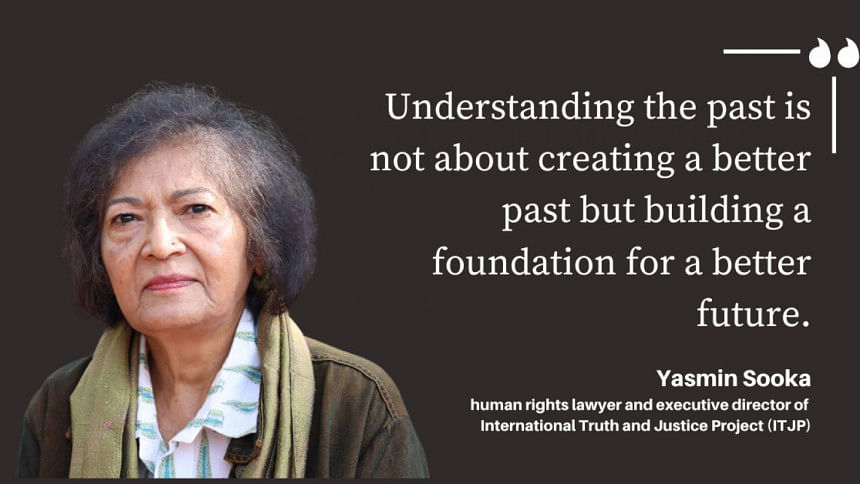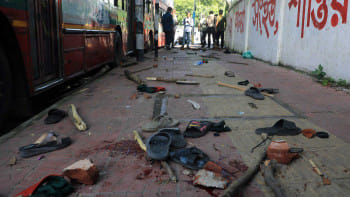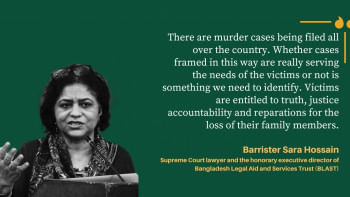Digital technology can bring clarity to the July-August atrocities

A 15-minute film has put together video clips of one of the most brutal crackdowns of the July-August uprising by the police. Many of us have seen some of these clips of shootings outside Jatrabari Police Station on August 5 when hundreds of protesters were marching towards the ousted Prime Minister's official residence Gono Bhaban, sure of victory ahead. But to see them together with the narrator giving details of the horrific scenes makes it clear that the police action on August 5, the day Sheikh Hasina fled the country, was a well-orchestrated, cold-blooded massacre that had been given clearance from the very top.
The film, launched on January 14, after months of forensic investigation, by International Truth and Justice Project (ITJP), Tech Global Institute and The Outsider Movie Company, provides valuable evidence that can be used to bring the perpetrators to justice. In an exclusive interview, Yasmin Sooka, a human rights lawyer who has dedicated four decades to human rights and transitional justice and now is executive director of ITJP, shares how detailed forensic investigation is crucial, not only for the process of justice sought by each victim's family but for the overall understanding of the systemic installation and perpetuation of brutal repression by the state.
ITJP, headed by Sooka with its London office run by journalist Frances Harrison, has been documenting human rights violations in Sri Lanka since 2014, focusing on the atrocities committed during the final phases of the Sri Lankan civil war. Sooka also chairs the Commission on Human Rights in South Sudan, established in 2016 by the United Nations Human Rights Council in Geneva. The commission is mandated to monitor the human rights situation and address accountability for serious crimes in South Sudan.
In early 2024, Sooka's organisation was about to investigate economic crimes and corruption in Bangladesh. But while they were discussing which particular cases to look at, the student protests erupted in July and Sooka and her co-workers immediately directed their focus on documenting the violence unfolding. It was clear that evidence had to be collected in real time to ensure accuracy and authenticity. Collaborating with local researchers, such as British journalist David Bergman and a young team from the Tech Global Institute, Sooka's organisation gathered testimonies and cellphone footage from victims' families. This evidence was crucial for truth recovery, as many families lacked first-hand knowledge of what had happened to their loved ones.
Sooka emphasises the revolutionary role digital technology plays in modern justice systems. As incriminating as the footage was, her team had to ensure that the evidence would be admissible in court—through proper authentication. This included using advanced methods like geolocation and chronolocation. Collaborating with experts experienced in documenting crimes in Sri Lanka, the team reconstructed events to establish patterns of state-sponsored violence. "When you look at modern conflicts and the rise of social media you begin to see that this is going to play an important role in evidentiary material before any kind of trial or any kind of tribunal," says Sooka. "The challenge," Sooka explains, "is preserving the chain of custody and ensuring the footage is tamper-proof, especially in an era where AI manipulation is a possibility."
These efforts culminated in two documentaries detailing police brutality during the protests, including incidents at Jatrabari Police Station and the killing of Hridoy Ali, a protester.
The documentaries made it quite clear that the violence had been orchestrated and sponsored by the state. Sooka recounted how unarmed protesters faced live ammunition from police forces acting on orders from the highest levels of government. "This was not panic-driven," she says. "It was deliberate, calculated, and ordered by the highest levels (of authority)."
The team's goal was not just to document the atrocities but to use the documentaries as part of evidence in the legal process. The team intends to have private screenings with victims' families to provide them with a sense of justice and clarity, as well as public screenings to initiate critical conversations about accountability.
Sooka and her colleagues, including Spanish prosecutor Carlos Castresana Fernández, conducted training sessions for prosecutors (including the chief prosecutor) and investigators of Bangladesh's International Crimes Tribunal (ICT). These sessions focused on modern methods of proving crimes against humanity. However, says Sooka, ICT faces significant challenges such as resource constraints and limited access to digital technology. She stresses that these challenges must be addressed to ensure the effectiveness of the trials.
Sooka believes that the end goal is for Bangladesh to establish a broader truth recovery process. "Trials address individual accountability," she explains, "but they don't uncover the structural underpinnings that enable systemic violence." Drawing from her experience in South Africa's Truth and Reconciliation Commission where she was appointed by President Nelson Mandela in 1995, Sooka advocates for a state commission to investigate how institutional failures allowed for repression, corruption, and inequality. Such a commission could also investigate the role of corporations, media, and political parties in perpetuating injustices. For Bangladesh, this process could create a national narrative acknowledging past abuses and promoting a more equitable future.
Sooka stresses the importance of national dialogue in shaping Bangladesh's future. "Understanding the past is not about creating a better past but building a foundation for a better future," she said. She emphasises the role of students and civil society in building a Bangladesh free from repression and inequality. While trials can bring perpetrators to justice, Sooka believes they must be complemented by institutional reforms, reparations, and initiatives promoting historical memory. She points to South Africa's approach to reconciliation, emphasising accountability, acknowledgment of violations, and societal healing over mere forgiveness.
Sooka says that there is some confusion regarding the term "truth commission" and many people think that it automatically means "reconciliation" which is not the case.
"We would call this a truth recovery process," she says, "which is aimed at building a new narrative for the country around how it was possible for Bangladesh to have so many years of repressive governments and how it was possible for this kind of institutionalised state-sponsored violence to happen. A truth commission would also allow you to look at the question of corruption which is another big factor in many of our countries." Sooka believes the fact that the chief adviser has established several major commissions is a step in the process of truth recovery.
For Yasmin Sooka, justice is not just about holding the guilty accountable and punishing them but creating a society where such violations will never occur again. Through her commitment to seeking justice by unravelling the truth and advocating systemic reforms, Sooka gives hope to Bangladesh and many other nations that have had to bear the brunt of decades of state repression.
Aasha Mehreen Amin is joint editor at The Daily Star.
Follow The Daily Star Opinion on Facebook for the latest opinions, commentaries and analyses by experts and professionals. To contribute your article or letter to The Daily Star Opinion, see our guidelines for submission.

 For all latest news, follow The Daily Star's Google News channel.
For all latest news, follow The Daily Star's Google News channel. 








Comments